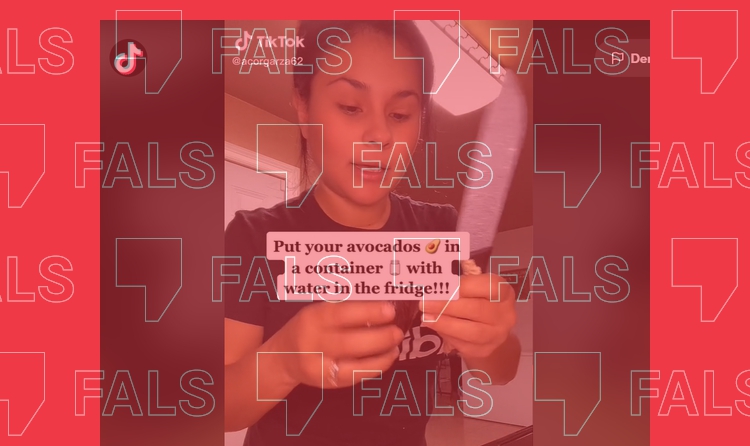Storing avocados in water is a dangerous practice

In recent weeks, a number of videos have gone viral on TikTok that show a …

In recent weeks, a number of videos have gone viral on TikTok that show a supposed trick for keeping avocados in good condition for two weeks, which consists of putting them in a container with water and storing them in the refrigerator. It is FALSE. Storing vegetables in water slows down their ripening and drying process, but it is not an advisable practice with any type of food because it promotes the proliferation of a number of pathogenic microorganisms, such as Listeria monocytogenes, which causes the illness listeriosis.
Putting avocados in water and storing them in the refrigerator keeps them in good condition for two weeks
The supposed trick of submerging avocados in water to keep them in good condition for days and even weeks is not new, but it has gone viral again over the past few weeks and months. Various TikTok videos of this have amassed millions of views. This ostensible preservation strategy has even made it into mainstream media. However, as the press department of the Catalan Food Security Agency (Agència Catalana de Seguretat Alimentària, or ACSA) states in an email to Verificat, this “practice is not recommended”.
The agency’s press office explains to Verifica that looks can be deceiving. “Storing avocados in water in the refrigerator causes the processes of ripening and drying to slow down”, so it appears that these storage conditions are good. However, the email warns, this practice “could also cause germs to multiply, since the moist conditions provided by the water can facilitate their growth”.
In fact, this is not a factor that only affects avocados. According to the ACSA press office, the risk of microorganisms multiplying applies to all vegetables and foods that have been submerged in water and stored in the refrigerator, although the risk is lower if the foods are fried, cooked or baked before being consumed.
Listeria monocytogenes
In their email, the agency names Listeria monocytogenes as the main pathogen to consider thanks to its capacity (Spanish only) to multiply even at refrigeration temperatures, i.e. between 2 and 4 degrees Celsius. It is the bacteria that causes listeriosis, a foodborne illness that is transmitted “chiefly by eating contaminated foods”, including raw vegetables, explains Spain’s National Institute for Safety and Hygiene at Work (Instituto Nacional de Seguridad e Higiene en el Trabajo, Spanish only).
Its ideal growth environment is between 30 and 37ºC, a temperature that is usually reached in summer. As a result, health institutions recommend washing and peeling vegetables just before eating them.
A single bacteria does not have the power to infect a human being. Rather, there is a minimum quantity of colony-forming units needed for the illness to be transmitted (the European Union regulation requires foods to not have more than 100 colony-forming units per gram). Submerging avocados in water gives the microorganism an environment in which it can multiply, as explained by the ACSA press office, which is why the supposed storage strategy that has gone viral is actually dangerous.
Listeriosis is usually asymptomatic, but it can produce mild gastrointestinal symptoms and high fevers. The risk is higher for certain risk groups, including immuno-compromised people, the elderly, pregnant women and children. Between 2015 and 2018, 1,369 cases of the illness were diagnosed in Spain, with an overall mortality rate of 9.1% (124 deaths), according to the epidemiological report on the illness in Spain.
The different species of Salmonella, a group of bacteria that cause the illness known as salmonella, caused more than 52,000 cases of infection in the European Union in 2020 – of which 3,500 occurred in Spain.